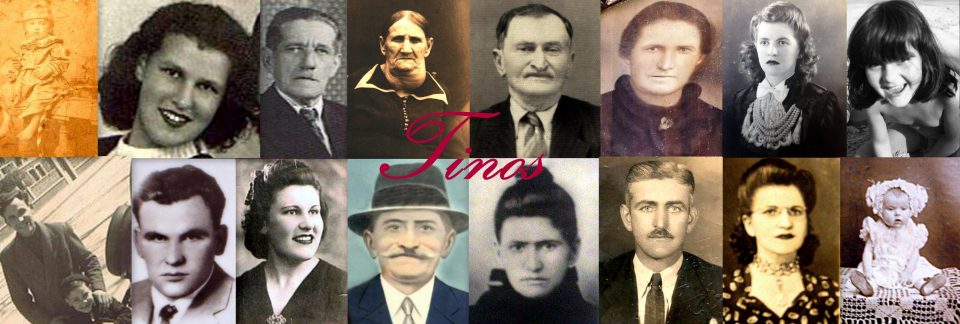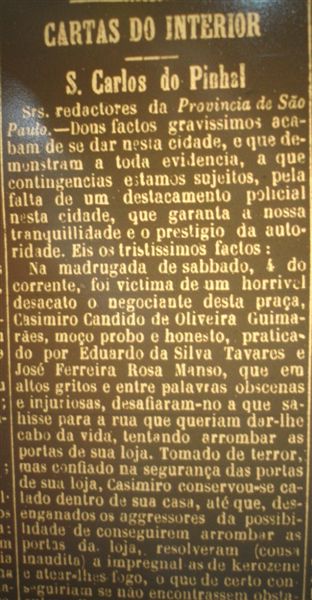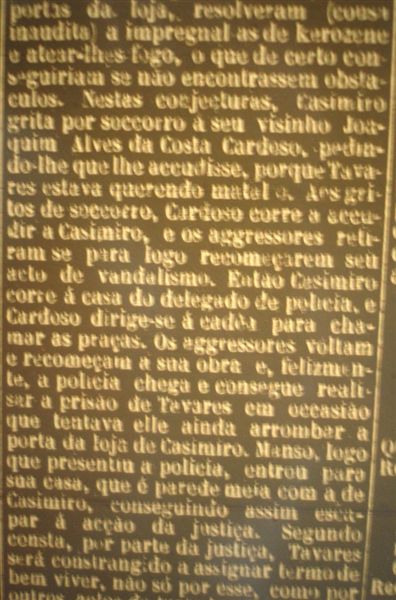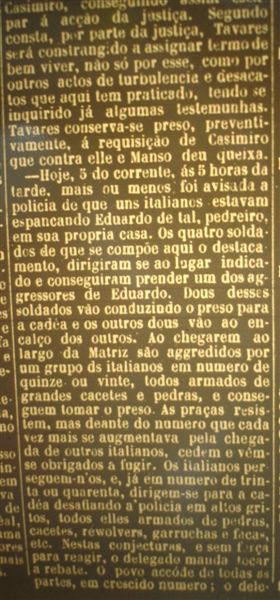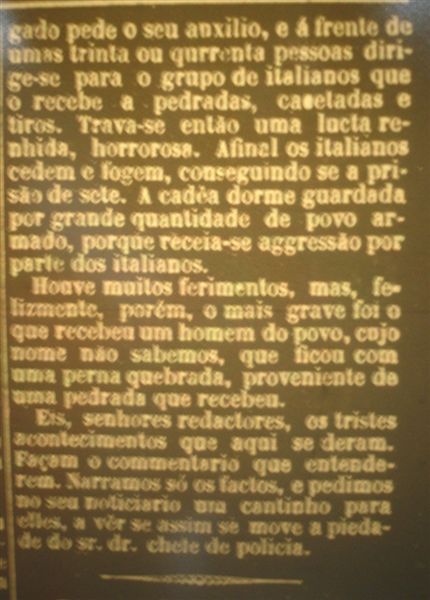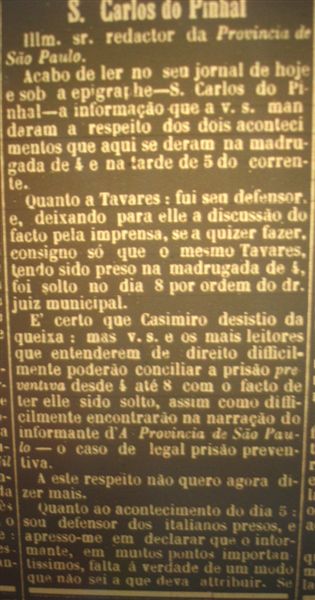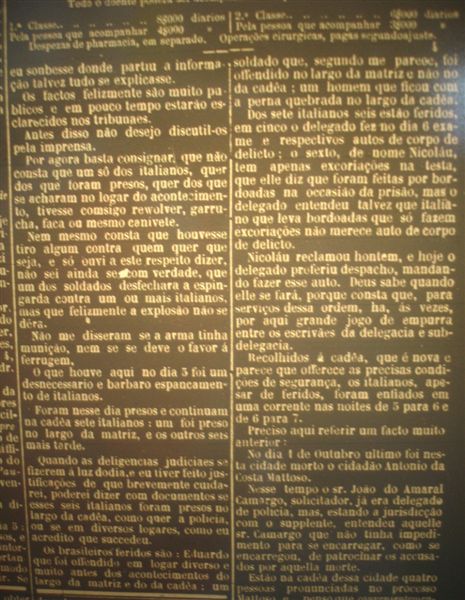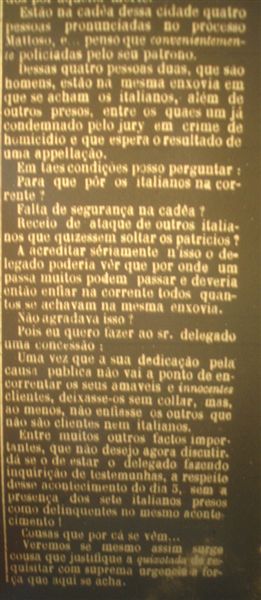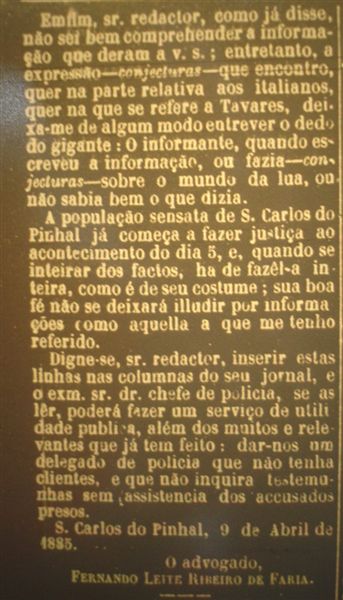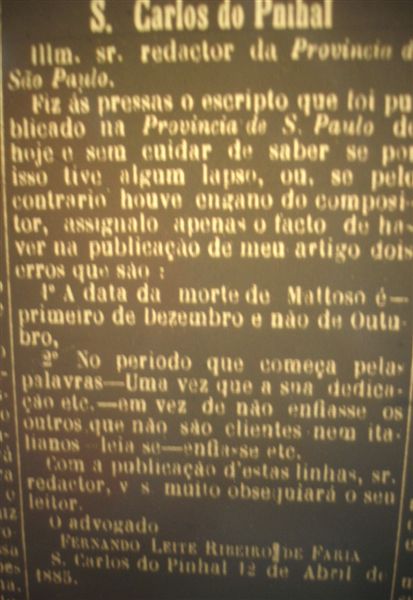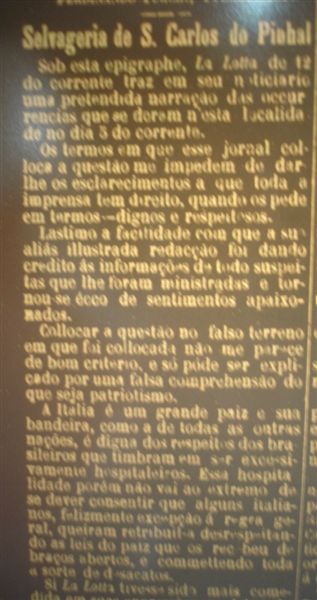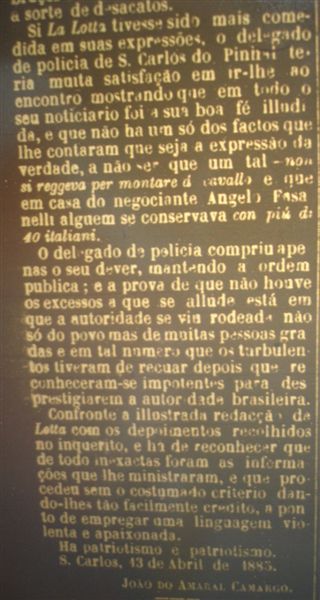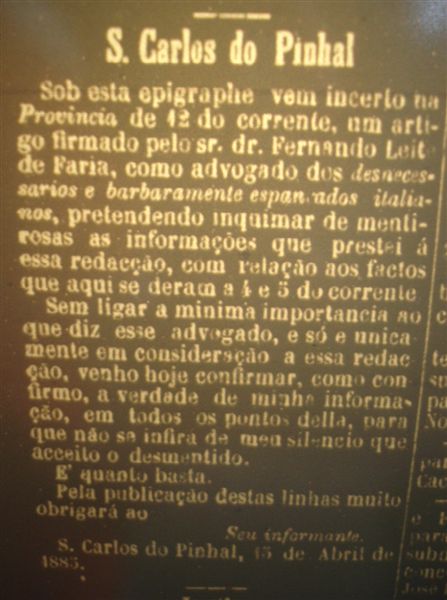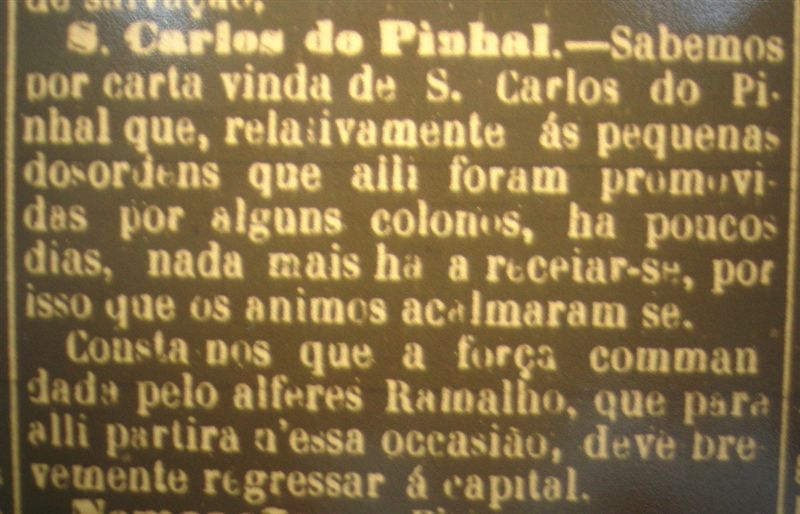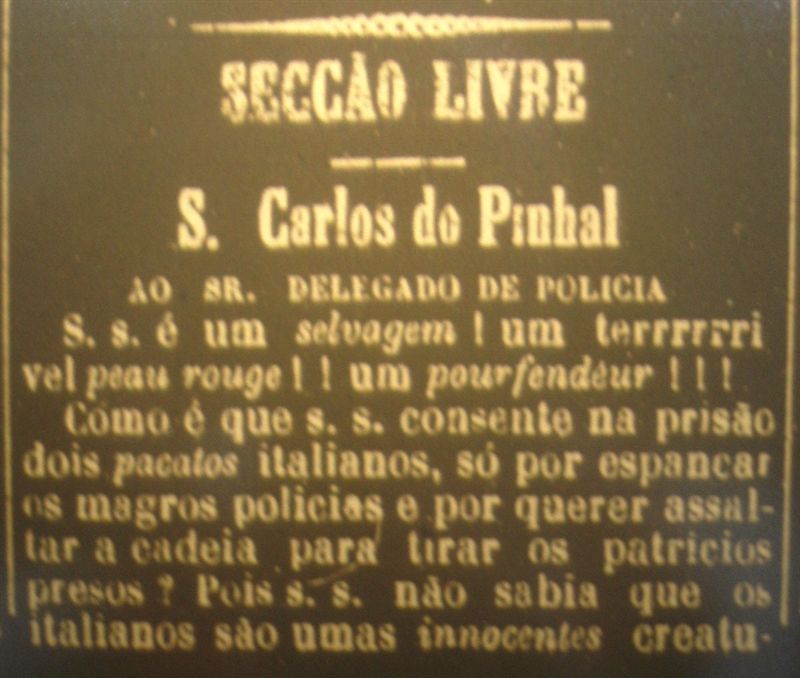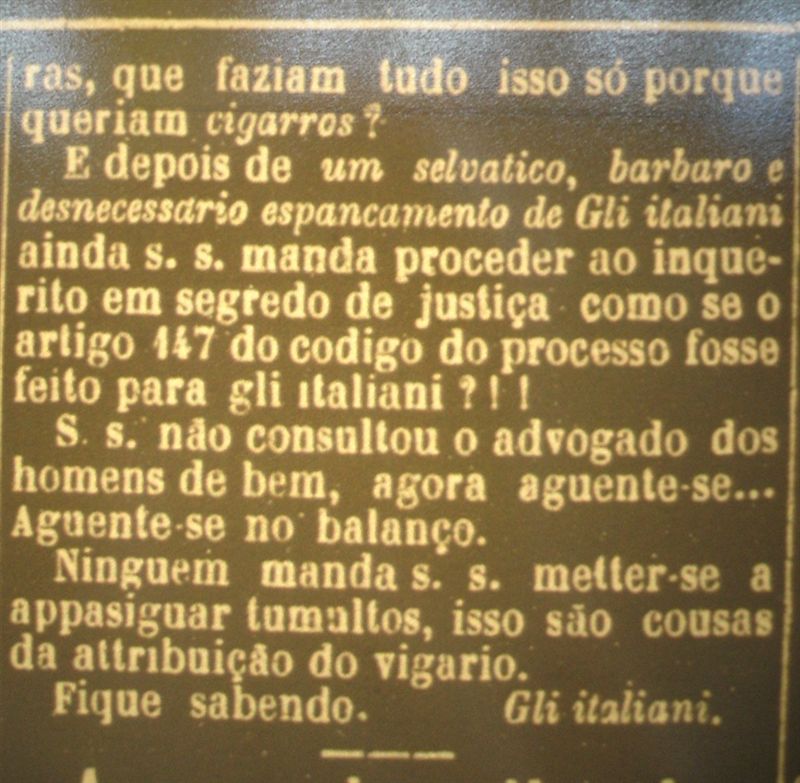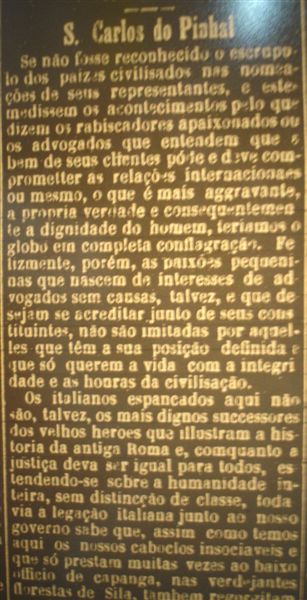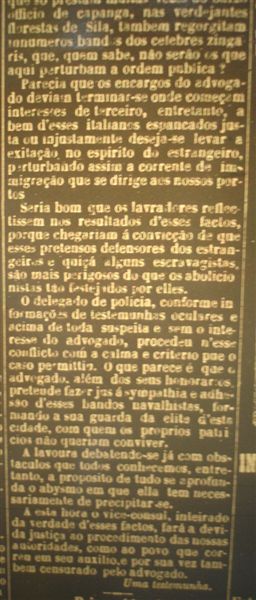SÃO CARLOS
– Jornal Província de São Paulo ( atual Estado de São Paulo) – 9/4/1885 – São Paulo, Brasil.
Only one week before Tinos Family arrival in Brazil, news from São Carlos, the city where they were contracted to live and work at – anonymous letter to the newspaper informing about a fight involving a group of Italian immigrants accused of putting fire in the shop of a local merchant in São Carlos.
Apenas uma semana antes da chegada da Família Tinos ao Brasil, notícias de São Carlos, a cidade para onde eles foram contratados para morar e traballhar – uma carta anônima enviada ao jornal informando sobre uma briga envolvendo um grupo de italianos acusados de colocarem fogo na loja de um comerciante local.
Transcription / Transcrição – (Jornal Província de São Paulo – 9/4/1885)
pág. 01
Cartas do Interior
________
S. Carlos do Pinhal
Srs. Redactores da Provincia de São Paulo. – Dous factos gravissimos acabam de se dar nesta cidade, e que demonstram a toda evidencia, a que contingencias estamos sujeitos, pela falta de um destacamento policial nesta cidade, que garanta a nossa tranquilidade e o prestigio da autoridade. Eis os tristissimos factos:
Na madrugada de sabbado, 5 do corrente, foi victima de um horrivel desacato o negociante desta praça, Casimiro Candido de Oliveira Guimarães, moço probo e honesto, praticado por Eduardo da Silva Tavares e José Ferreira Rosa Manso, que em altos gritos e entre palavras obscenas e injuriosas, desafiaram-no a que sahisse para a rua que queriam dar-lhe cabo a vida, tentando arrombar as portas de sua loja. Tomado de terror, mas confiado na segurança das portas de sua loja, Casimiro conservou-se calado dentro de sua casa, até que, desenganados os aggressores da possibilidade de conseguirem arrombar as portas da loja, resolveram ( cousa inaudita) a impregnal as de kerozene e atear-lhes fogo, o que de certo conseguiriam se não encontrassem obstaculos. Nestas conjecturas, Casimiro grita por socorro a seu visinho Joaquim Alves da Costa Cardoso, pedindo-lhe que lhe accudisse, porque Tavares estava querendo matal o. Aos gritos de socorro, Cardoso corre a accudir a Casimiro, e os aggressores retiram se para logo recomeçarem seu acto de vandalismo. Então Casimiro corre á casa do delegado de policia, e Cardoso dirige-se á cadêa para chamar as praças. Os aggressores voltam e recomeçam a sua obra e, felizmente, a policia chega e consegue realisar a prisão de Tavares em occasião que tentava elle ainda arrombar a porta da loja de Casimiro. Manso, logo que presentiu a policia, entrou para a sua casa, que é parede meia com a de Casimiro, conseguindo assim escapar á acção da justiça. Segundo consta, por parte da justiça, Tavares será constrangido a assignar termo de bem viver, não só por esse, como por outros actos de turbulencia e desacatos que aqui tem praticado, tendo se inquerido já algumas testemunhas. Tavares conserva-se preso, preventivamente, á requisição de Casimiro que contra elle e Manso deu queixa.
— Hoje, 5 do corrente, ás 5 horas da tarde, mais ou menos, foi avisada a policia de que uns italianos estavam espancando Eduardo de tal, pedreiro, em sua propria casa. Os quatro soldados de que se compõe aqui o destacamento, dirigiram se ao logar indicado e conseguiram prender um dos aggressores de Eduardo. Dous desses soldados vão conduzindo o preso para cadêa e os outros dous vão ao encalço dos outros. Ao chegarem ao largo da Matriz são aggredidos por um grupo de italianos em numero de quinze ou vinte, todos armados de grandes cacetes e pedras, e conseguem tomar o preso. As praças resistem, mas deante do numero que cada vez mais se augmentava pela chegada de outros italianos, cedem e vêm-se obrigados a fugir. Os italianos perseguem-n os, e , já em numero de trinta ou quarenta, dirigem-se para a cadêa desafiando a policia em altos gritos, todos eles armados de pedras, cacetes, rewolvers, garruchas e faca-,etc. Nestas conjecturas, e sem força para reagir, o delegado manda tocar a rebate. O povo accode de todas as partes, em crescido numero; o delegado pede o seu auxilio, e a frente de umas trinta ou quarenta pessoas dirige-se para o grupo de italianos que o recebe a pedradas, cacetadas e tiros. Trava-se então uma lucta renhida, horrorosa. Afinal os italianos cedem e fogem, conseguindo se a prisão de sete. A cadêa dorme guardada por grande quantidade de povo armado, porque receia-se aggressão por parte dos italianos.
Houve muitos ferimentos, mas, felizmente, porém, o mais grave foi o que recebeu um homem do povo, cujo nome não sabemos, que ficou com uma perna quebrada, proveniente de uma pedrada que recebeu.
Eis, senhores redactores, os tristes acontecimentos que aqui se deram. Façam o commentario que entenderem. Narramos só os factos, e pedimos no seu noticiario um cantinho para elles, a ver se assim se move a piedade do sr. dr. chefe de policia.
Translation – (Jornal Província de São Paulo – 9/4/1885)
Page 01 – Letters from the Interior – S. Carlos do Pinhal City
Srs. Editors of the Province of São Paulo. “Two serious incidents have just occurred in this city, and they show all the evidence, to which contingencies we are subject, for the lack of a proper police station squadron in this city, to guarantee our tranquility and the prestige of authority. Here are the very sad facts:
At dawn on Saturday, the 5th of the current month, the local merchant, Casimiro Candido de Oliveira Guimarães, a proper and honest young man was a victim of a terrible contempt practiced by Eduardo da Silva Tavares and José Ferreira Rosa Manso, who, shouting obscene and injurious words, challenged him to go out into the street to be killed and try to break through the doors of his shop. Taken with terror, but confident of the safety of the doors of his shop, Casimiro remained silent within his house, until, when the aggressors, unable to break open the doors of the store, resolved (unbelievably) to put kerozene and set the door on fire, which they would certainly do if they did not encounter obstacles. In these conjectures, Casimiro cries for help to his neighbor Joaquim Alves da Costa Cardoso, asking for protection, because Tavares wanted to kill him. Heariing the cries for help, Cardoso rushes to help Casimiro, and the aggressors left briefly to resume their act of vandalism soon later on. Then Casimiro runs to the police officer’s house, and Cardoso goes to the local prison to call the police officers. The aggressors returned and resumed their work and, fortunately, the police arrived and managed to realize the arrest of Tavares on an occasion that he was still trying to break into the door of Casimiro’s shop. Manso, as soon as he sensed the police, went into his house, which is half-walled with Casimiro’s, and managed to escape the action of justice. According to the evidence, on the part of the justice, Tavares will be constrained to sign a term of good-conduct behavior, not only for this, but also for other acts of turbulence and contempt that he has been practicing here, and some witnesses have already been asked. Tavares remains imprisoned, preventively, at the request of Casimiro, who against him and Manso made an judicial complaint.
— Today, 5th of this month, at about 5 o’clock in the afternoon, or so, the police were informed that some Italians were beating a certain Eduardo, a builder in his own house. The four soldiers who compose our local police force, went to the indicated place and managed to arrest one of Eduardo’s aggressors. Two of these soldiers went to take the prisoner to the prison, and the other two soldiers went to follow the others aggressors. When they arrive at the Central Church Square, they were attacked by a group of Italians in the number of fifteen or twenty, all armed with large sticks and stones, who manage to take the prisoner. The soldiers resist, but more and more Italians arrived and they were forced to flee. The Italians chase after them, and as many as thirty or forty go to the front of the prison, defying the police in loud shouts, all armed with stones, sticks, guns, knives, etc. In these conjectures, and without force to react, the delegate orders to play the rebate. People of all the parts and in great number arrive to help. The delegate asks for their help, and a front of about thirty or forty people goes to the group of Italians who receive then with stones, slashes and shots. Then a fierce, horrible struggle ensues. After all the Italians give in and flee, being arrested only seven. The prison is guarded by a large number of armed people, because it is feared new aggression on the part of the Italians.
There were many injuries, but fortunately, however, the most serious was a man of the people, whose name we do not know, who was left with a broken leg from a stone he received.
These are, editors, the sad events that took place here. Make the commentary you wish. We only tell the facts, and we ask for a little corner of the newpaper to have tehm published, hoping that it will help to move the mercy of Mr. Dr. Chief of police.
– Jornal Província de São Paulo ( atual Estado de São Paulo) – 12/4/1885 – São Paulo, Brasil.
Reply from the lawyer of the Italian group saying that the police was abusive causing injures to the group of Italian inside the prison.
Resposta do advogado do grupo de italianos dizendo que a polícia foi abusiva causando injures ao grupo de italianos dentro da prisão.
Transcription / Transcrição – (Jornal Província de São Paulo – 12/4/1885)
pág. 1 e 2
S. Carlos do Pinhal
Illm. Sr. redactor da Provincia de São Paulo
Acabo de ler no seu jornal de hoje e sob a epigraphe – S. Carlos do Pinhal – a informação que a v.s. mandaram a respeito dos dois acontecimentos que aqui se deram na madrugada de 4 e na tarde de 5 do corrente.
Quanto a Tavares: fui seu defensor, e , deixando para elle a discussão do facto pela imprensa, se a quizer fazer, consiguo só que o mesmo Tavares, tendo sido preso na madrugada de 4, foi solto no dia 8 por ordem do dr. juiz municipal.
É certo que casimiro desistio da queixa: mas v.s. e os mais leitores que entenderem de direito difficilmente poderão conciliar a prisão preventiva desde 4 até 8 com o facto de ter elle sido solto, assim como difficilmente encontrarão na narração do informante d’ A Provincia de São Paulo – o caso de legal prisão preventiva.
A este respeito não quero agora dizer mais.
Quanto ao acontecimento do dia 5: sou defensor dos italianos presos, e apresso-me em declarar que o informante, em muitos pontos importantissimos, falta a verdade de um modo que não sei a que deva attribuir. Se eu soubesse donde partiu a informação talvez tudo se explicasse.
Os factos felizmente são muito publicos e em pouco tempo estarão esclarecidos nos tribunaes.
Antes disso não desejo discutil-os pela imprensa.
Por agora basta consignar que não consta que um só dos italianos, quer dos que foram presos, quer dos que se acharam no logar do acontecimento, tivessem comsigo rewolver, garrucha, faca ou mesmo canivete.
Nem mesmo consta que houvesse tiro algum contra quem quer que seja, e só ouvi a este respeito dizer, não sei ainda se com verdade, que um dos soldados desfechara a espingarda contra um ou mais italianos, mas que felizmente a explosão não se déra.
Não me disseram se a arma tinha munição, nem se se deve o favor á ferrugem.
O que houve aqui no dia 5 foi um desnecessario e barbaro espancamento de italianos.
Foram nesse dia presos e continuam na cadêa sete italianos: um foi preso no largo da matriz, e os outros seis mais tarde.
Quando as deligencias judiciais se fizerem á luz do dia, e eu tiver feito justificações do que brevemente cuidarei, poderei dizer com documentos se esses seis italianos foram presos no largo da cadêa, como quer a policia, ou se em diversos logares, como eu acredito que succedeu.
Os brasileiros feridos são: Eduardo que foi offendido em logar diverso e muito antes dos accontecimentos do largo da matriz e do da cadêa e um soldado que, segundo me parece, foi offendido no largo da matriz e não no da cadêa; um homem que ficou com a perna quebrada no largo da cadêa.
Dos sete italianos seis estão feridos, em cinco o delegado fez no dia 6 exame e respectivos autos de corpo de delicto: o sexto, de nome Nicoláu, tem apenas excoriações na testa, que elle diz que foram feitas por bordoadas na occasião da prisão, mas o delegado entendeu talvez que italiano que leva bordoada que só foram excoriações não merece auto de corpo de delicto.
Nicoláu reclamou hontem, e hoje o delegado proferiu despacho, mandando fazer esse auto. Deus sabe quando elle se fará, porque consta que, para serviços dessa ordem, ha, ás vezes, por aqui grande jogo de empurra entre os escrivães da delegacia e subdelegacia.
Recolhidos á cadêa, que é nova e parece que offerece as precisas condições de segurança, os italianos, apesar de feridos, foram enfiados em uma corrente nas noites de 5 para 6 e de 6 para 7.
Preciso aqui referir um facto muito anterior:
No dia 1 de outubro ultimo foi nesta cidade morto o cidadão Antonio da Costa Mattoso.
Nesse tempo o sr. João do Amaral Camargo, solicitador, já era delegado de policia, mas, estando a jurisdicção com o supplente, entendeu aquelle sr. Camargo que não tinha impedimento para se encarregar, como se encarregou, de patrocinar os accusados por aquella morte.
Estão na cadêa dessa cidade quatro pessoas pronunciadas no processo Mattoso, e … penso que convenientemente policiadas pelo seu patrono.
Dessas quatro pessoas duas, que são homens, estão na mesma enxovia em que se acham os italianos, além de outros presos, entre os quaes um já condemnado pelo jury em crime de homicidio e que espera o resultado de uma appellação.
Em taes condições posso perguntar:
Para que pôr os italianos na corrente?
Falta de segurança na cadêa?
Receio do ataque de outros italianos que quizessem soltar os patricios?
A acreditar sériamente n’isso o delegado poderia vêr que por onde um passa muitos podem passar e deveria então enfiar na corrente todos quantos se achavam na mesma enxovia.
Não agradava isso?
Pois eu quero fazer ao sr. delegado uma concessão:
Uma vez que a sua dedicação pela causa publica não vai a ponto de encorrentar os seus amaveis e innocentes clientes, deixasse-os sem collar, mas, ao menos, não enfiasse os outros que não são clientes nem italianos.
Entre muitos outros factos importantes, que não desejo agora discutir, dá se o de estar o delegado fazendo inquirição de testemunhas, a respeito desse acontecimento do dia 5, sem a presença dos sete italianos presos como delinquentes no mesmo acontecimento!
Cousas que por cá se vêm…
Veremos se mesmo assim surge cousa que justifique a quizolada de requisitar com suprema urgencia >> força que aqui se acha.
Enfim, sr. redactor, como já disse, não sei bem comprehender a informação que deram a v.s.; entretanto, a expressão – conjecturas – que encontro, quer na parte relativa aos italianos, quer na que se refere a Tavares, deixa-me de algum modo entrever o dedo do gigante: O informante, quando escreveu a informação, ou fazia – conjecturas – sobre o mundo da lua, ou não sabia bem o que dizia.
A população sensata de S. Carlos do Pinhal já começa a faz justiça ao acontecimento do dia 5, e, quando se inteirar dos factos, ha de fazêl-a inteira, como é de seu costume; sua boa fé não se deixará illudir por informações como aquella a que me tenho referido.
Digue-se, sr. redactor, inserir estas linhas nas colomnas do seu jornal, e o exm. sr. dr. chefe de policia, se as lêr, poderá fazer um serviço de utilidade publica, além dos muitos e relevantes que já tem feito: dar-nos um delegado de policia que não tenha clientes, e que não inquira testemunhas sem, assistencia dos accusados presos.
S. Carlos do Pinhal, 9 de Abril de 1885.
O advogado.
Fernando Leite Ribeiro de Faria.
Translation – (Jornal Província de São Paulo – 12/4/1885)
Pages 1 and 2 – S. Carlos do Pinhal City
Illm. Mr. editor of the Province of São Paulo
I have just read in your newspaper today under the epigraph – S. Carlos do Pinhal City – the information published about the two events that occurred here at dawn of 4th and the afternoon of 5th of the current month.
As for Tavares, I was his defender, and, I will let him to respond to the discussion of the fact by the press, if he wish to do so – I only would like to inform that the same Tavares, arrested at dawn of 4th, was released on the 8th by order of Dr. Judge of the Municipal Court.
It is certain that Casimiro cancelled his formal judicial complaint. For those of you and the most readers who understand about law, will have trouble to conciliate pre-trial detention from 4th to 8th with the fact that he has been released, as they will hardly find in the narration of the informant of the Province of São Paulo – the case of legal preventive detention.
In this respect I want to say no more.
As for the event on the 5th, I am a defender of the Italians arrested, and I will be quick to state that the informant, in many important points, lacks the truth in a way that I do not know how to justify. If I knew who sent the information maybe everything would be explained.
The facts fortunately are very public and in a short time they will be clarified in the tribunals.
Before that I do not wish to discuss them in the press.
For now it is enough to state that it is not declared that any of the Italians, either of those arrested or of those who found themselves at the scene, had guns, knife or even a pocketknife.
It is not even declared that there was any shot against anyone, and I only heard in that regard, I do not know yet for truth whether one of the soldiers had shot the shotgun at one or more Italians, but fortunately the explosion did not happen.
They did not tell me whether the weapon had ammunition, or whether it did not work due to rust.
What happened here on the 5th was an unnecessary and barbaric beating of Italians.
Seven Italians were arrested and remain since that day: one was arrested in the Central Church Square, and the other six later.
The judicial diligence were placed during office hours. I am still investigating them as I may say with documents whether these six Italians were arrested in the prison square, as the police want, or in several places, as I believe it was what succeeded.
The wounded Brazilians are: Eduardo, who was offended in a different place and long before the events of the Central Church Square and of the Prison Square; and a soldier who, it seems to me, was offended in the Central Church Square, not in the Prison Square; A man had his leg a broken at the Prison Square.
Six of the seven Italians are wounded. In five of them the delegate did the due “corpus delicti” examination. The sixth, by the name of Nicolau, has only excoriations on the forehead, which he says were made but the soldiers’s strike at the time of the arrest, But the delegate understood perhaps that Italian who was bitten anf got only excoriations does not deserve a proper “corpus delicti” examination.
Nicolau made a complain yesteray, and today the delegate issued an order for the examination. God knows when it will be done, because it is said that, for services of this order, there is sometimes a great game of delay between the clerks of the police station and sub- police stations.
The Italians – although wounded and in a new prison that seems to offer the necessary safety conditions – were tucked into a chain on both nights of the 5th to the6th and of the 6th to the 7th.
I need to mention here a much earlier fact:
On October 1st, the citizen Antonio da Costa Mattoso was killed in this city.
At that time Mr. João do Amaral Camargo, solicitor, was already the police delegate officer, but, being the jurisdiction with the suppliant, he understood that he had no impediment to take charge, as he did, of sponsoring those accused of that death.
There are four people in the prison of that city from the Mattoso case, and … I think they are conveniently policed by the patron of the prison.
From these four people, two men, are in the same cell where the Italians are, as well as other prisoners, among them, one whom is already condemned by the jury for homicide and awaiting the result of an appeal.
Under such conditions I may ask:
Why put the Italians on the chain?
There was a lack of security in the prison?
To prevent the attack of other Italians who could try to release the patricians?
Seriously believing in this, the delegate could see that where one passes many can pass and then he should then put in a chain all prisoners of the prison.
Wouldn’t it to be satisfactory?
I want to do give a concession to mr. Delegate.
Since his dedication to the public cause does not go so far as to put a chain in his friendly and innocent clients, he would leave them without a chain, but at least he should not put a chain to others who are neither customers nor Italians.
Among many other important facts, which I do not wish to discuss now, there is the fact that the delegate has been interviews witnesses regarding this event on the 5th, without also interviewing the seven Italians arrested as delinquents in the same event!
Things that happen here …
We will see if anything arises that justifies the quest to request with supreme urgency the force that is here.
Therefore, mr. Editor, as I have already said, I do not know how to comprehend the information given to you; However, the expression – conjectures – which I find in both the Italian and Tavares sections, let me somehow glimpse the finger of the giant: The informant, when he wrote the information, either did – conjectures – about the world of the moon, or he did not quite know what he was saying.
The sensible population of S. Carlos do Pinhal City has already begin to do justice to the accusation of the 5th, and when they will learn the whole facts, they will do full justice, as it is their habit. Their good faith will not be deceived by information such as that to which I have referred.
Please, Mr. Editor, could you insert these lines in the columns of your newspaper, and I hpe exm. Mr. Dr. Chief of Police, if he read them, will be able to do a public service, besides the many and relevant ones he has already done: by giving us a delegate police officer who has no clients, and who does not interview witnesses without also interviewing the accused prisoners.
S. Carlos do Pinhal City , April 9th, 1885.
The lawyer.
Fernando Leite Ribeiro de Faria.
– Jornal Província de São Paulo ( atual Estado de São Paulo) – 14/4/1885 – São Paulo, Brasil.
Date corrections from the lawyer of the Italian group.
Correção de datas do advogado do grupo de italianos.
Transcription / Transcrição (Jornal Província de São Paulo – 14/4/1885)
pág. 01
S. Carlos do Pinhal
Illm. sr. redactor da Provincia de São Paulo.
Fiz ás pressas escripto que foi publicado na Provincia de S. Paulo de hoje e sem cuidar de saber se por isso tive algum lapso, ou, se pelo contrario houve engano do compositor, assignalo apenas o facto de haver na publicação do meu artigo dois erros que são:
1º A data da morte de Mattoso é – primeiro de Dezembro e não de Outubro.
2º No periodo que começa pelas palavras – Uma vez que sua dedicação etc. – em vez de não enfiasse os outros que não são clientes nem italianos leia se – enfia-se etc.
Com a publicação d’estas linhas, sr. redactor, v s muito obsequiará o seu leitor.
O advogado
Fernando Leite Ribeiro de Faria
São Carlos do Pinhal 13 de Abril de 1885.
Translation – (Jornal Província de São Paulo – 14/4/1885)
page 01 – S. Carlos do Pinhal City
Illm. Mr. Editor of the Province of São Paulo. I hurried to the writing the article that was published in the Province of S. Paulo today and without reviewing the text to know if I made some lapses, or, if on the contrary, there were any typing mistakes when my text was published. either way, in fact I found two erros in the publication of my article, which are:
1º The date of Mattoso’s death is – first of December and not of October.
2º In the period beginning with the words – Since his dedication etc. – instead of not putting in chain others who are not customers or Italians, we shall read if – putting in chain etc.
The publication of these lines, Mr. Editor, you will very much appreciate by your readers.
The lawyer
Fernando Leite Ribeiro de Faria
São Carlos do Pinhal April 13, 1885.
– Jornal Província de São Paulo ( atual Estado de São Paulo) – 16/4/1885 – São Paulo, Brasil.
Another opinion against the lawyer of the Italian Group, saying that the police only did their duty in preserve the order in the city.
Mais uma opinião contrária á do advogado do grupo de italianos, dizendo que a polícia apenas cumpriu sua obrigação de manter a ordem na cidade.
Transcription / Transcrição (Jornal Província de São Paulo – 16/4/1885)
pág. 02
Salvageria de S. Carlos do Pinhal
Sob esta epigraphe, La lotta de 12 do corrente traz em seu noticiario uma pretendida narração das occorencias que se deram n’esta localidade no dia 5 do corrente.
Os termos em que esse jornal colloca a questão me impedem de darlhe os esclarecimentos a que toda a imprensa tem direito, quando os pede em termos – dignos e respeitosos.
Lastimo a facilidade com que a sua aliás illustrada redacção foi dando credito ás informações de tudo suspeitas que lhe foram ministradas e tornou-se deco de sentimentos apaixonados.
Collocar a questão no falso terreno em que foi collocada não me parece de bom criterio, e só póde ser explicado por uma falsa comprehensão do que seja patriotismo.
A Italia é um grande paiz e sua bandeira, como a de todas as outras nações, é digna dos respeitos dos brasileiros que timbram em ser excessivamente hospitaleiros. Essa hospitalidade porém não vai ao extremo de se dever consentir que alguns italianos, felizmente excepção á regra geral, queiram retribuil a desrespeitando as leis do paiz que os recebeu de braços abertos, e commettendo toda a sorte de desacatos.
Si La Lotta tivesse sido mais comedida em suas expressões, o delegado de policia de S. Carlos do Pinhal teria muita satisfação em ir-lhe ao encontro mostrando que todo o seu noticiario foi a sua boa fé illudida, e que não ha um só dos factos que lhe contaram que seja a expressão da verdade, a não ser que um tal – non se reggera per montare á cavallo e que em casa do negociante Angelo Fasa nelli alguem se conservava com piú di 40 italiani.( em italiano – não se impulsionou a montar cavalo e ir até a casa do negociante Angelo Fasa se reunir com mais de 40 italianos.)
O delegado de policia compriu apenas o seu dever, mantendo a ordem publica; e a prova de que não houve os excessos a que se allude está em que a autoridade se via rodeada não só do povo mas de muitas pessoas gradas e em tal numero que os turbulentos tiveram que recuar depois que reconheceram-se impotentes para desprestigiarem a autoridade brasileira.
Confronte a illustrada redacção da Lotta com os depoimentos recolhidos no inquerito, e há de reconhecer que de todo inexatas foram as informações que lhe ministraram, e que procedem sem o costumado criterio dando-lhes tão facilmente credito, a ponto de empregar uma linguagem violenta e apaixonada.
Ha patriotismo e patriolismo.
S. Carlos, 13 de Abril de 1885.
João do Amaral Camargo
Translation – (Jornal Província de São Paulo – 16/4/1885)
Page 02 Savagery of S. Carlos do Pinhal City
Under this epigraph, the newspaper “La Lotta” from the 12th of the current month, brings in its news an intended narration of the situations that occurred in this locality on day the 5th of the current month.
The terms in which this paper addressed the issue prevent me from giving you the clarifications to which the entire press is entitled, when you ask for them in worthy and respectful terms.
I regretted the ease with which his otherwise illustrated editorial team gave credence to the suspicious information given to it and became the object of passionate feelings.
Placing the question on the false ground in which it was placed does not seem to me to be a good criterion, and it can only be explained by a false comprehension of what patriotism is.
Italy is a great country and its flag, like that of all other nations, is worthy of the respects of the Brazilians who like to be excessively hospitable. This hospitality, however, does not go to far as to allow some Italians, fortunately exception to the general rule, to reciprocate by disrespecting the laws of the country which received them with open arms, and committing all sorts of contempt.
If La Lotta had been more lenient in her expressions, the police officer of S. Carlos do Pinhal City would have been very pleased to meet with the newspaper team, showing that your good faith was deceived by the information received, and that none of the facts described it is the expression of truth, unless such a person ” (in Italian – did not help itself in mounting the horse to go to the house of the businessman Angelo Fasa where there were more then 40 Italians).
The delegate police officer did only his duty, maintaining the public order; And the proof that there was no excesses is that authority was surrounded not only by the general population but also by high social position people, and in such numbers that the turbulent ones had to retreat after they recognized themselves as impotent to discredit the Brazilian authority.
Confront Lotta’s illustrated article with the testimonials collected in the judicial process , and the newspaper shall acknowledge that the information received was not accurate, and that its editorial team proceeded without the usual criterion, giving them so readily credit, to the point of employing a violent passionate language.
There are real patriotism and false patriotism.
S. Carlos, April 13th, 1885.
João do Amaral Camargo
– Jornal Província de São Paulo ( atual Estado de São Paulo) – 17/4/1885 – São Paulo, Brasil.
Reply from the anonymous person who started the subject in the newspaper, reconfirming what he first said.
Resposta da pessoa anônima que iniciou o assunto no jornal, reconfirmado o que ele disse no começo.
Transcription / Transcrição – (Jornal Província de São Paulo – 17/4/1885)
pág. 02
S.Carlos do Pinhal
Sob esta epigraphe vem incerto na Provincia de 12 do corrente, um artigo firmado pelo sr. dr. Fernando Leite de Faria, como advogado dos “desnecessario e barbaramente espancados italianos”, pretendendo inquimar de mentirosas as informações que prestei á essa redacção, com relação aos factos que aqui se deram a 4 e 5 do corrente.
Sem ligar a minima importancia ao que diz esse advogado, e só e unicamente em consideração a essa redacção, venho hoje confirmar, como confirmo, a verdade de minha informação, em todos os pontos della, para que não se infira de meu silencio que acceito o desmentido.
É quanto basta.
Pela publicação destas linhas muito obrigará ao.
Seu informante.
São Carlos do Pinhal, 15 de Abril de 1885.
Translation – (Jornal Província de São Paulo – 17/4/1885)
S.Carlos do Pinhal
Under this epigraph comes uncertain in the Province Newpaper of 12th of the current month, an article signed by Mr. Dr. Fernando Leite de Faria, as a lawyer of the “unnecessary and barbarically beaten Italians”, intending to declare as false the information I gave to this newspaper, regarding the facts that happened here on the 4th and the 5th of the current month.
Without attaching the slightest importance to what this lawyer says, and only in consideration of this newspaper, I hereby confirm today, as I confirm, the truth of my information, in all points of it, so that it is not inferred from my silence that I accept the denial of what I said.
That’s enough.
Thank you very much for the publication of these lines.
Your informant.
São Carlos do Pinhal, April 15th, 1885.
– Jornal Província de São Paulo ( atual Estado de São Paulo) – 18/4/1885 – São Paulo, Brasil.
Newspaper note saying that the situation in São Carlos in calm and under control.
Nota do jornal dizendo que a situação em São Carlos é calma e sob controle.
Transcription / Transcrição – (Jornal Província de São Paulo – 18/4/1885)
pág. 02
S. Carlos do Pinhal – Sabemos por carta vinda de S. Carlos do Pinhal que, relativamente ás pequenas desordens que alli foram promovidas por alguns colonos, ha poucos dias, nada mais ha a recear-se, por isso que os animos acalmaram se.
Consta nos que a força commandada pelo alferes Ramalho, que para alli partira n’essa occasião, deve brevemente regressar á capital.
Translation – (Jornal Província de São Paulo – 18/4/1885)
Page 02 – S. Carlos do Pinhal City –
We know from a letter from S. Carlos do Pinhal that, with regard to the small disturbances that have happened there by some settlers, a few days ago, there is nothing more to be feared, which is why the minds have calmed themselves.
It is said that the force commanded by the lieutenant Ramalho, who had gone there on that occasion, should soon return to the capital.
– Jornal Província de São Paulo ( atual Estado de São Paulo) – 19-22/4/1885 – São Paulo, Brasil.
Very sarcastic comment pretending to be signed by “The Italians”, saying that the police should not get in their way and they had all rights to fight the police and try to free the Italians that were in the prison.
Comentário extremantente sarcástico como se fosse assinado “Pelos italianos”, dizendo que a polícia não deveria se meter nesse assunto e que eles tinham todo o direito de tentar libertar os italianos que estavam na prisão.
Transcription / Transcrição – (Jornal Província de São Paulo – 19-22/4/1885)
pág. 01
Secção livre
________
S. Carlos do Pinhal
Ao sr. DELEGADO DE POLICIA
S. s. É um selvagem ! um terrrrrrivel peau rouge !! Um pourfendéur !!!
Como é que s. s. consente na prisão de dois pacatos italianos, só por espancar os magros policiais e por querer assaltar a cadeia para tirar os patricios presos ? Pois s. s. não sabia que os italianos são umas innocentes creaturas, que faziam tudo isso só porque queriam cigarros ?
E depois de um selvatico, barbaro e desnecessario espancamento de Gli italiani ainda s. s. manda proceder ao inquerito em segredo de justiça como se o artigo 147 do codigo do processo fosse feito para gli italiani ? ! !
S. s. não consultou o advogado dos homens de bem, agora aguente-se… Aguente-se no balanço.
Ninguem manda s. s. metter-se a appasiguar tumultos, isso são cousas da attribuição do vigario.
Fique sabendo.
Gli italiani.
Translation – (Jornal Província de São Paulo – 19-22/4/1885)
Free section – S. Carlos do Pinhal
To Mr. DELEGATE OF POLICE OFFICER
Sir, You are a savage! A terrrrrivel “Red Skin” (in French) !! A “Slayer” !!! ( in French)
How could you Sir to consent to the arrest two peaceful Italian, only because they beat the skinny cops and want to remove from jail their imprisoned patricians? Didn’t you know that the Italians are innocent creatures, who did all this just because they wanted cigarettes?
And after a selvage, barbaric and unnecessary beating of “the Italians” ( in Italian) still you Sir gave orders to proceed with the inquiry in secrecy as if the article 147 of the law was made for “The Italians” (in Italian)? ! !
You sir did not consult the lawyer of the good men, now hold on … Hold on to the swing.
It is not your business sir to try to keep the order. This is the vicar’s duty.
Be aware.
“The Italians” ( in Italian)
– Jornal Província de São Paulo ( atual Estado de São Paulo) – 23/3/1885 – São Paulo, Brasil.
A person with a conservative speech testifying that the police was diligent in dealing with the group of troublemakers from Italy; and that their lawyer’s attitude was irresponsible. One of the paragraphs if
Uma pessoa com discurso conservativo, testemunhando que a polícia agiu digigentemente com o grupo de italianos desordeiros; e que a atitude do advogado deles é irresponsável.
Transcription / Transcrição – (Jornal Província de São Paulo – 23/3/1885)
pág. 01
S. Carlos do Pinhal
Se não fosse reconhecido o escrupolo dos paizes civilisados nas nomeações de seus representantes, e estes medissem os acontecimentos pelo que dizem os rabiscadores apaixonados ou os advogados que entendem que o bem de seus clientes póde e deve comprometter as relações internacionaes ou mesmo, o que é mais aggravante, a propria verdade e consequentemente a dignidade do homem, teriamos o globo em completa conflagração. Felizmente, porém, as paixões pequeninas que nascem de interesses de advogados sem causas, talvez, e que desejam se acreditar junto de seus constituintes, não são imitadas por aquelles que têm a sua posição definida e que só querem a vida com a integridade e as honras da civilisação.
Os italianos espancados aqui não são, talvez, os mais dignos sucessores dos velhos heroes que illustram a historia da antiga Roma e, conquanto a justiça deva ser igual a todos, estendendo-se sobre a humanidade inteira, sem distincção de classe, toda via a legação italiana junto ao nosso governo sabe que, assim como temos aqui os nossos caboclos insociaveis e que só prestam muitas vezes ao baixo officio de capanga, nas verdejantes floresta de Sila, tambem regorgitam innumeros bandos dos celebres zingaris, que, quem sabe, não serão os que aqui pertubam a ordem publica?
Parecia que os encargos do advogado deveriam terminar-se onde começa os interesses de terceiros, entretanto, a bem d’esses italianos espancados justa ou injustamente deseja-se levar a exitação no espirito do estrangeiro, perturbando assim a corrente de immigração que se dirige aos nossos portos.
Seria bom que lavradores refletissem nos resultados d’esses factos, porque chegariam á convicção de que esses pretensos defensores dos estrangeiros e quiçá alguns escravagistas, são mais perigosos do que os abolicionistas tão festejados por elles.
O delegado de policia, conforme informações de testemunhas oculares e acima de toda suspeita e sem o interesse do advogado, procedeu n’esse conflicto com a calma e criterio que o caso permittia. O que parece é que o advogado, além dos seus honorarios, pretende fazer jus á sympathia e adhesão d’esses bandos navalhistas , formando a sua guarda da elite d’esta cidade, com quem os proprios patricios não queriam conviver.
A lavoura debatendo-se já com obstaculos que todos conhecemos, entretanto, a proposito de tudo se aprofunda o abysmo em que ella tem necessariamente que precipitar-se.
A esta hora o vice-consul, inteirado da verdade d’esses factos, fará a devida justiça ao procedimento das nossas autoridades, como ao povo que correu em seu auxilio, e por sua vez tambem censurado pelo advogado.
Uma testemunha.
Translation – (Jornal Província de São Paulo – 23/3/1885)
Page 1 – S. Carlos do Pinhal City
If it were not recognized the scruple of the civilized countries in the appointments of their representatives, and if they would measure the events by what passionate scrawl makers or lawyers who understand that the good of their clients could and should compromise the international relations or even, what is more aggravating, the truth itself and consequently the dignity of man – we would have the globe in complete conflagration. Fortunately, however, the petty passions which arise from the interests of lawyers without cause, perhaps, and who wish to gain credit from their constituents, are not imitated by those who have their definite position and who only want life with integrity and honors of the civilization.
The Italians beaten here are perhaps not the most worthy successors of the old heroes who illustrate the history of ancient Rome, and while justice must be equal to all, extending over all mankind without distinction of class, The Italian legation with our government knows that, just as we have our unsociable mongrels here, who often only are useful as a derogatory henchman, in the green forest of Sila, there are also innumerable bands of the celebrated Zingaris, who, perhaps, are the ones disturb public order here?
It seemed that the charges of the lawyer should be terminated where the interests of third parties begin, however, in favor of these Italians who were justly or unjustly bitten, this lawyer wishes to excite the foreigner’s spirits, thus disturbing the flow of immigration addressed to our ports.
It would be good for rural workers to reflect on the results of these facts, for they would come to the conviction that these pretended defenders of foreigners and perhaps of some slaver owners are more dangerous than the abolitionists so celebrated by them.
The delegate police officer, according to information from eyewitnesses and above all suspicion and without the interest of the lawyer, proceeded in this conflict with the calm and criterion that the case allowed. What seems to be that the lawyer, besides owning his fees, intends to own the sympathy and adhesion of these “razor gang” groups, forming his guard of the elite in this city, with whom the patricians themselves do not want to be familiar with.
The farming plantations are already fighting to survive with obstacles that we all know, however, the whole thing deepens the abysmal in which it must necessarily precipitate.
At this hour the (Italian) vice consul, acquainted with the truth of these facts, will do the due justice to the procedure of our authorities, as to the people who rushed to his aid – also censured by the lawyer.
A witness.
